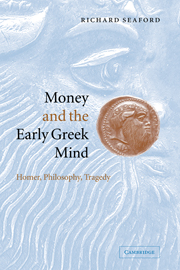Book contents
- Frontmatter
- Contents
- Preface
- List of abbreviations
- 1 Introduction
- PART ONE THE GENESIS OF COINED MONEY
- PART TWO THE MAKING OF METAPHYSICS
- 9 Did politics produce philosophy?
- 10 Anaximander and Xenophanes
- 11 The many and the one
- 12 Heraclitus and Parmenides
- 13 Pythagoreanism and Protagoras
- 14 Individualisation
- 15 Appendix: was money used in the early Near East?
- References
- Index
9 - Did politics produce philosophy?
Published online by Cambridge University Press: 22 September 2009
- Frontmatter
- Contents
- Preface
- List of abbreviations
- 1 Introduction
- PART ONE THE GENESIS OF COINED MONEY
- PART TWO THE MAKING OF METAPHYSICS
- 9 Did politics produce philosophy?
- 10 Anaximander and Xenophanes
- 11 The many and the one
- 12 Heraclitus and Parmenides
- 13 Pythagoreanism and Protagoras
- 14 Individualisation
- 15 Appendix: was money used in the early Near East?
- References
- Index
Summary
LAW, PUBLIC SPACE, FREE DEBATE
The fundamental transition in thought, towards what we call science and philosophy (or ‘philosophical cosmology’), that occurred among the Ionian Greeks of the sixth century bc may be characterised in various ways. Examination of the complexity of the transition has produced numerous qualifications: the unevenness of its development, the presence of a form of science earlier among the Babylonians and Egyptians, the persistence of dogmatic or magical elements in seemingly rational discourse, and so on. And I am well aware that what may legitimately be included in the broad term ‘philosophy’ is found already in Homer and Hesiod. But that some such crucial transition occurred is generally agreed. My concern is not so much to describe it in detail as with the various attempts that have been made to explain it. Suffice it to say that what I select for explanation is the advent of the idea of the universe as an intelligible order subject to the uniformity of impersonal power. More specifically, central to early Greek cosmology is the counter-intuitive idea of a single substance underlying the plurality of things manifest to the senses. Inasmuch as this latter idea implies concern with reality as opposed to appearance, with what is fundamental as opposed to what is derivative, and with comprehensive as opposed to partial understanding, it is metaphysical.
- Type
- Chapter
- Information
- Money and the Early Greek MindHomer, Philosophy, Tragedy, pp. 175 - 189Publisher: Cambridge University PressPrint publication year: 2004



